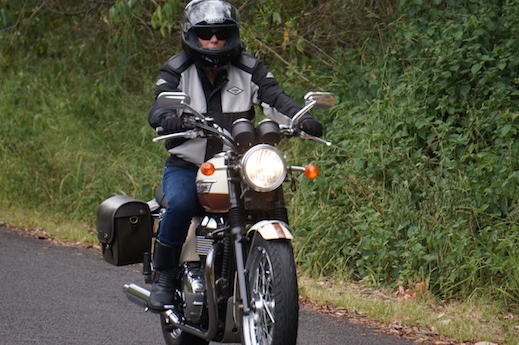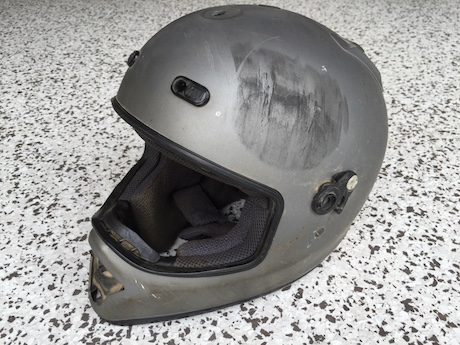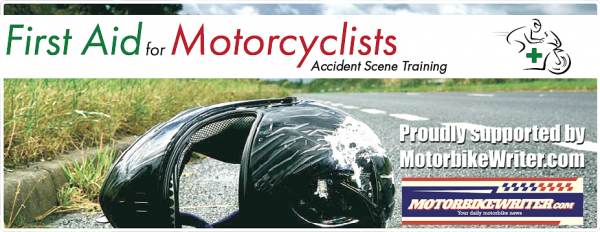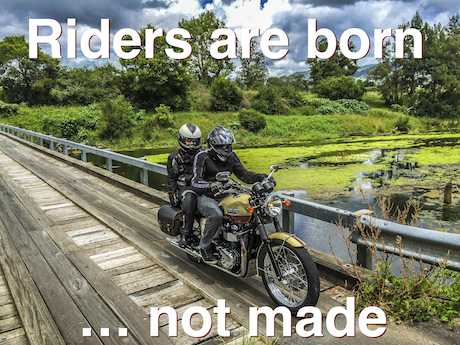Getting back on the “steel horse” again after a serious crash is considered either brave, stupid or too difficult for some.
Maybe I’m one of the “stupid” ones who got back on, despite one major life-threatening crash in which I was run over – check out the helmet at the top of this article!
And maybe I’m also stupid because I’ve crashed so many times yet I’m still riding.
But getting back on the bike again has never been easy.
Often it is physically challenging because of the injury you have sustained. However, that usually goes away as you recover.
For some it doesn’t and they have to adapt their bike. For example, five-time world champion Mick Doohan had to use a thumb-operated foot brake to continue racing after badly injuring his leg.
But this article is about the psychological difficulties of returning to riding, not the physical, so we have enlisted the help of psychologist and reborn rider Sharon Ledger.

We’ve broken down the barriers into categories and provided you with ways to conquer these and return to your beloved two wheels.
THE BOSS
Your wife/husband/partner may decide that you are no longer allowed to ride. Or maybe your work boss decides to ban you from riding.
Thankfully, both my wife and work boss have been very supportive of me.
Sharon advises that you need to have open communication with your partner.
“Never say to your partner ‘Don’t be stupid’,” she says. “Tell them that riding is your passion, your outlet and without it, you won’t be the same.
“Ask your partner how they would feel if they couldn’t do their passion any more.
“Acknowledge that they are upset and worried and ask what you can do to make them feel more comfortable with your return to riding.
“Perhaps you could make some suggestions of your own such as downloading some of these emergency apps, taking a rider training course or a first-aid course.”
(Motorbike Writer recommends the First Aid for Motorcyclists course.)
Sharon suggests that you may also need to make some changes to placate your “boss”.
“Maybe you should buy a different type of bike and a different colour so they don’t associate it with your old bike.
“You may also have to change your riding pattern.
“If the accident happened on the way to work, tell your boss you’ll take the train and only ride for leisure.
“If you crashed at night, perhaps suggest to your partner that you will only ride in the daylight.
“Remind them that accidents happen infrequently and that’s why they’re called accidents.”
PEER PRESSURE
If your friends give you a hard time, get new friends. Why should you surround yourself with negativity?
“Tell your friends that you will ride again, whether they agree or not, but you would prefer to do it with their support,” Sharon says.
“Tell them you need to ride again for your mental health, but you also need their support. Ask them to be part of the process of getting back on the ‘horse’.
“A true friend will back you up. If they aren’t supportive, they’re not really a friend.”

ANXIETY
Letting fear prevent you from riding again can be bad for your mental health, Sharon says.
“If you feed fear, it can spiral out of control and lead to other fears, phobias and a general sense of anxiety.
“But if you conquer those fears, it is very empowering.”
She advises you take small steps to returning to riding.
“Go for a short, safe, but fun ride first time,” she says. “You need to ride so there is no fear of crashing again.
“Being worried you will crash will only make you a bad rider.”
She advises that you gradually build up to longer distances and more challenging roads.
WHY YOU SHOULD RIDE AGAIN
You want to ride again because it’s in your genes, says Sharon.
“Don’t fight it and suppress it as that’s bad for your mental health.
“Your first ride after a crash will release those familiar endorphins and make you feel happy.
“Once you experience that, you will be on the road to full mental health recovery.”




